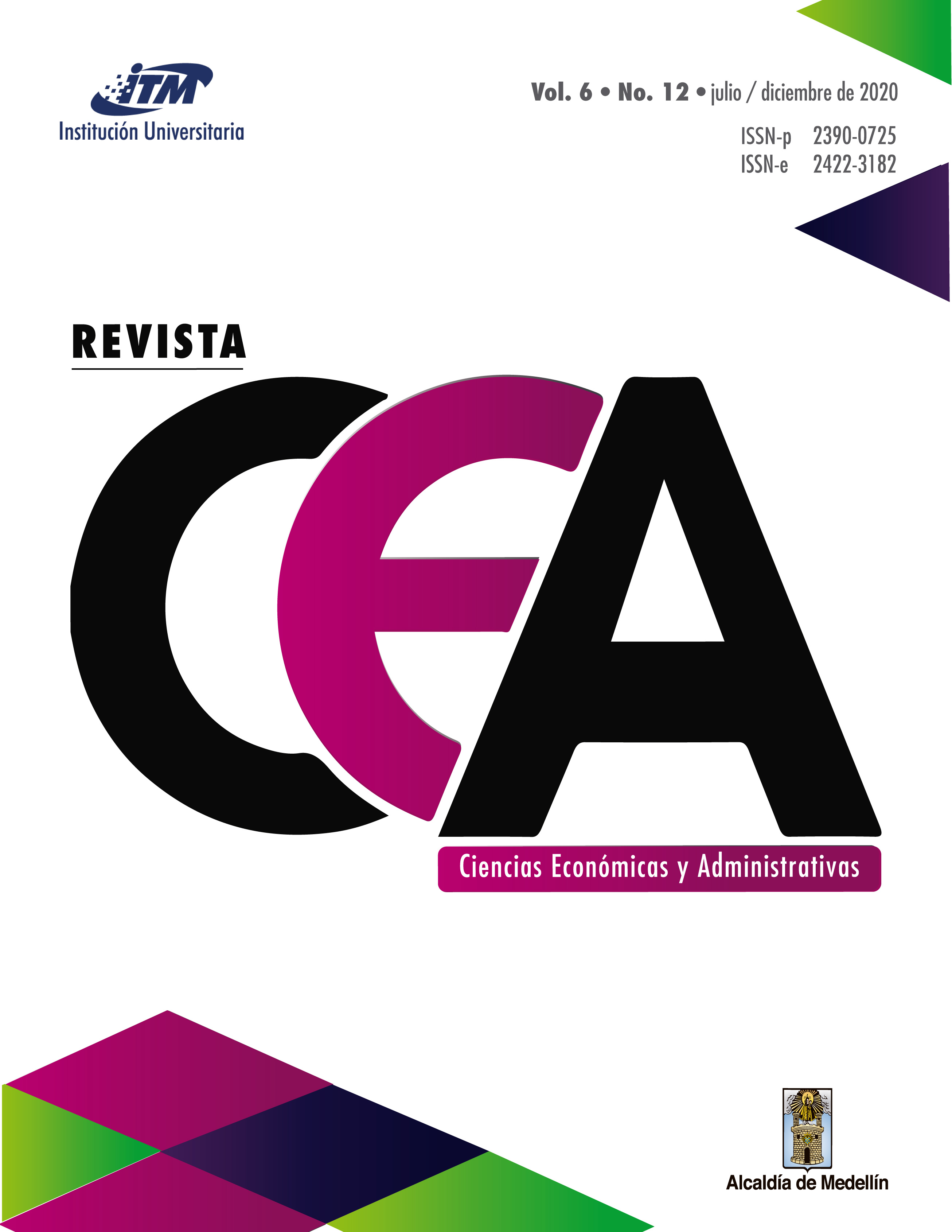Curriculum Management Modeling Based on Context-Sensitive Business Processes
Abstract
This paper aims to propose an approach to curriculum management modeling in universities based on the fundamentals of business processes and with a special focus on context-sensitive information. The importance of the context lies in the need to control more information of the surroundings to improve expressiveness in the representation and intelligent reasoning of knowledge. The context is modeled by entities related to the domain of execution, as well as by contextual situations associated with said environment. Automated reasoning is carried out by implementing an intelligent algorithm that uses clustering techniques. This algorithm considers the contextual information of a process and then generates contextual alerts that support decision making. For the automated processing of such information, we design a system that simulates and records process executions using data sets for the log of each process. Some of our findings include a formal representation of curriculum management based on situations that enrich the information of each business process. According to the results, we may conclude that curriculum-related information is context-sensitive and might, thus, affect the execution of the processes associated with curriculum management. Therefore, we recommend designing automated reasoning rules that consider the context for decision making in curriculum management processes.
References
Barrón Tirado, M. C.; Díaz Barriga, F. (2016). Curriculum Management and the Role of Curriculum Actors. TCI Transnational Curriculum Inquiry, v. 13, n. 2, 13-33. https://ojs.library.ubc.ca/index.php/tci/article/view/188285
Benedict, T.; Bilodeau, N.; Vitkus, P.; Powell, E.; Morris, D.; Scarsig, M.; Lee, D.; Field, G.; Lohr, T.; Saxena, R. (2013). BPM CBOK Version 3.0: guide to the business process management common body of knowledge. ABPMP International/Createspace.
Cottrell, S.; Linger, B.; Shumway, J. (2004). Using information contained in the curriculum management information tool (CurrMIT) to capture opportunities for student learning and development. Medical Teacher, v. 26, n. 5, 423-427. https://doi.org/10.1080/0142159042000218650
Decreto 230 de 2002 [Ministerio de Educación Nacional de Colombia]. Por el cual se dictan normas en materia de currículo, evaluación y promoción de los educandos y evaluación institucional. 11 de febrero de 2002.
Dey, A. K. (2001). Understanding and using context. Personal and ubiquitous computing, v. 5, n. 1, 4-7. https://doi.org/10.1007/s007790170019
Dumas, M.; La Rosa, M.; Mendling, J.; Reijers H. A. (2013). Fundamentals of Business Process Management, Springer. https://doi.org/10.1007/978-3-662-56509-4
Giraldo Plaza, J.; Ovalle Carranza, D.; Santoro, F. (2019). Sistema para la Integración de procesos de Negocio basado en situaciones contextuales. Caso estudio: Admisión Universitaria. Scientia et Technica, v. 23, n. 4, 519-527.
González Jiménez, C. (2015). Diagnosis on curriculum management and administration headquarters interuniversity of Alajuela, National University Costa Rica. Calidad en la Educación Superior, v. 6, n. 2, 64-86. https://dialnet.unirioja.es/servlet/articulo?codigo=5580893
Jacobs, J.; Salas, A., Cameron, T.; Naguwa, G.; Kasuya, R. (2005). Implementing an online curriculum management database in a problem-based learning curriculum. Academic medicine: journal of the Association of American Medical Colleges, v. 80, n. 9, 840-846. https://doi.org/10.1097/00001888-200509000-00011
Kahloun, F.; Channouchi, S. A. (2016). Quality criteria and metrics for business process models in higher education domain: case of a tracking of curriculum offers process. Procedia Computer Science, v. 100, 1016-1023. https://doi.org/10.1016/j.procs.2016.09.274
Kim, S. N. (2005). The developmental directions and tasks of the School Based Curriculum Management system in Korea. Asia Pacific Education Review, v. 6, n. 1, 41-49. https://files.eric.ed.gov/fulltext/EJ728826.pdf
Krumm, J. (2010). Ubiquitous computing fundamentals. http://sociotech.pbworks.com/f/UbiquitousComputFundamen.pdf
La Rosa, M.; Van der Aalst, W. M. P.; Dumas, M.; Milani, F. P. (2017). Business process variability modeling: A survey. ACM Computing Surveys, v. 50, n. 1, 2. https://doi.org/10.1145/3041957
Maia, I. B.; Pacheco, J. A. (2019). Curriculum management based on results and standards and their effects on institutional evaluation. Laplage em Revista, v. 5, 18-30. https://www.laplageemrevista.ufscar.br/index.php/lpg/article/view/775
Makura, O. y Makura, A. H. (2012). Rethinking the definition and value of the curriculum concept: The Zimbabwe experience. The Anthropologist, v. 14, n. 6, 509-515. https://doi.org/10.1080/09720073.2012.11891276
Morales Martínez, M. E.; Preciado Duarte, N. Y.; Nader, V. S.; Hernández, C. P. (2017). La gestión curricular; procesos y tendencias. una revisión documental. Especialización en docencia universitaria. Fundación Universitaria de ciencias de la salud. Bogotá.
Ploesser, K.; Peleg, M.; Soffer, P.; Rosemann, M.; Recker, J. C. (2009). Learning from context to improve business processes. BPTrends, v. 6, n. 1, 1-7. https://eprints.qut.edu.au/17118/
Rosa, J. H.; Barbosa, J. L. V.; Kich, M.; Brito, L. (2015). A multi-temporal context-aware system for competences management. International Journal of Artificial Intelligence in Education, v. 25, n. 4, 455-492. https://doi.org/10.1007/s40593-015-0047-y
Saidani, O.; Nurcan, S. (2009, April). Context-awareness for adequate business process modelling. In 2009 Third International Conference on Research Challenges in Information Science, Fez, Morocco. https://doi.org/10.1109/RCIS.2009.5089281
Salgado Bustamante, M.; Medel Toro, J. (2015). Gestión curricular al servicio de aprendizajes significativos. [Tesis de Maestría en Liderazgo y Gestión de Establecimientos Educacionales, Universidad del Bío Bío]. http://repobib.ubiobio.cl/jspui/bitstream/123456789/377/1/Salgado_Bustamante_Marianela.pdf
Strȋmbei, C.; Dospinescu, O.; Strainu, R. M.; Nistor, A. (2016). The BPMN Approach of the University Information Systems. Ecoforum Journal, v. 5, n. 2. http://www.ecoforumjournal.ro/index.php/eco/article/view/408
Svensson, C.; Hvolby, H. H. (2012). Establishing a business process reference model for Universities. Procedia Technology, v. 5, 635-642. https://doi.org/10.1016/j.protcy.2012.09.070
Viciana, J.; Mayorga-Vega, D. (2016). Innovative teaching units applied to Physical Education-changing the curriculum management for authentic outcomes. Kinesiology, v. 48, n. 1, 142-152. https://doi.org/10.26582/k.48.1.1
Watson, E. G.; Moloney, P. J.; Toohey, S. M.; Hughes, C. S.; Mobbs, S. L.; Leeper, J. B.; McNeil, H. P. (2007). Development of eMed: a comprehensive, modular curriculum-management system. Academic medicine: journal of the Association of American Medical Colleges, v. 82, n. 4, 351–360. https://doi.org/10.1097/ACM.0b013e3180334d41
Weske, M. (2019). Business Process Management. Concepts, Languages, Architectures. https://doi.org/10.1007/978-3-662-59432-2
Wu, B.; Lin, R.; Wang, P.; Chen, J. (2016). Dynamic Business Process Generation and Verification. In 2016 IEEE International Conference on Services Computing (SCC). San Francisco. https://doi.org/10.1109/SCC.2016.118
Zimmer, W. K.; Keiper, P. (2020). Redesigning curriculum at the higher education level: challenges and successes within a sport management program. Educational Action Research. https://doi.org/10.1080/09650792.2020.1727348








